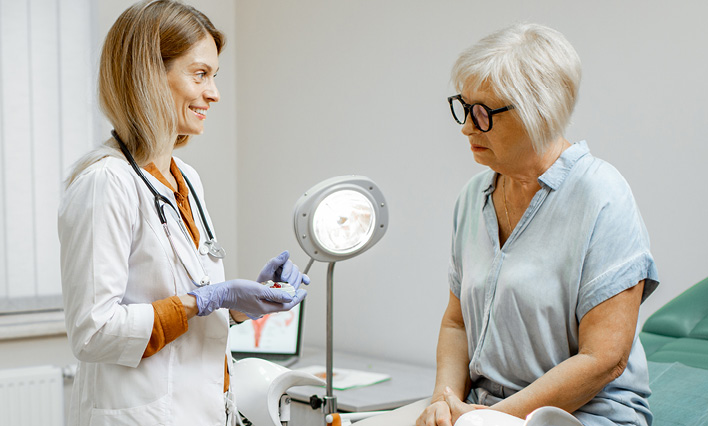If you menstruate (have periods), menopause is when your menstrual cycle ends for 12 consecutive months. Aside from the reproductive system, menopause also affects heart and bone health, brain function, sleep patterns, hormones, and more.
Findings from a 30-year-old groundbreaking study
The Women’s Health Initiative (WHI) is a long-term study launched by the National Heart, Lung, and Blood Institute in 1991 that enrolled more than 161,000 women across the country. The goal was to prevent heart disease, certain cancers, osteoporosis, and other diseases that are common in postmenopausal women.
Sarah Temkin, M.D., Associate Director for Clinical Research in the NIH Office of Research on Women’s Health (ORWH), called WHI a “groundbreaking” project.
“Until only a few years before WHI’s launch, women of reproductive age had been excluded from clinical research,” Dr. Temkin said. “So this idea of a massive research project centered around a health need that was experienced by women was really revolutionary for the time.”
WHI clinical trials tested whether menopausal hormone therapy (MHT)—medication that replaces the hormones someone loses during menopause, including estrogen and progestin—could lower the risk of cardiovascular disease later in life. Researchers studied a combination of estrogen and progestin, and they studied estrogen only. For these MHT trials, they used the most commonly prescribed dosages of hormones at the time.
In 2002, the study found that postmenopausal women who received the combined hormones had a higher risk of breast cancer and heart disease. The news led to a huge drop in use of MHT for menopausal symptoms.
However, since then newer data shows that MHT can be safe for some women—particularly younger, healthy women—to relieve symptoms in early menopause. This data also shows that estrogen-only MHT may even lower breast cancer risks.
That’s why it’s important to talk to your doctor about the best treatments for menopausal symptoms for you. If you need help finding more specialized care, the North American Menopause Society has a list of certified menopause practitioners across the United States.
The WHI study finished in 2005 but the data is still being gathered today. It also spurred other research on women’s health and aging.
More research on menopause symptoms
In 1994, NIH launched the Study of Women’s Health Across the Nation (SWAN). The goal was to understand physical, biological, physiological, and social changes that happen as women age. SWAN’s 3,300 participants were more racially and ethnically diverse and were younger than WHI participants.
Then in 2008, the NIH-funded Menopause Strategies: Finding Lasting Answers for Symptoms and Health (MsFLASH) trials discovered that some antidepressants could reduce hot flashes (a common symptom of menopause). MsFLASH also found that moderate exercise could help with menopause-related insomnia.
Since 2016, the Menopausal Vasomotor Symptoms and Brain Aging in Women (MsBRAIN) trial has studied menopause’s effects on short- and long-term brain health. Researchers also want to know whether these effects can help doctors detect Alzheimer’s disease because women are at higher risk than men for the condition.
MyMenoplan.org is a website that was developed with support from NIH. MyMenoplan.org has a tool to find treatment options based on your specific symptoms.
How do health disparities and social determinants of health affect menopause?
Menopause symptoms vary across racial and ethnic populations and by socioeconomic background. For example, the SWAN study found that hot flashes are more intense and more frequent for some races. It saw major differences in cardiovascular health among racial and ethnic groups. Black women are also more likely than White women to undergo hysterectomies, which sometimes include oophorectomies (surgery to remove the ovaries). Oophorectomies can bring on menopause symptoms earlier.
Other factors that affect people’s experiences of menopause include access to medical care and health insurance. Nutrition or obesity may also play a role in your menopause symptoms. Cultural variations like social stigma or the celebration of menopause are factors as well, Dr. Temkin said.
It’s unclear whether environmental factors can influence menopause and related aging or disease risk. That’s something NIH hopes more research will uncover. You can be a part of these future discoveries by joining an NIH clinical trial.
What is clear, Dr. Temkin said, is that menopause treatments should meet each person’s health care needs, preferences, and goals.
“There’s not a one-size-fits-all to experiencing the menopause transition. There’s a right time and a right place for the right patient to find a way to manage their symptoms,” Dr. Temkin said.







